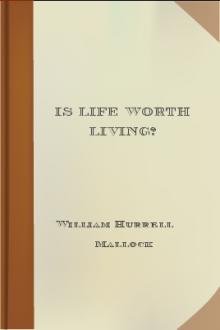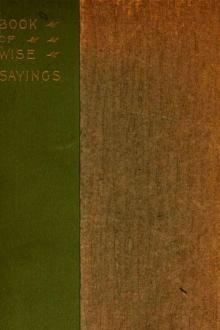Is Life Worth Living?, William Hurrell Mallock [if you give a mouse a cookie read aloud txt] 📗

- Author: William Hurrell Mallock
- Performer: -
Book online «Is Life Worth Living?, William Hurrell Mallock [if you give a mouse a cookie read aloud txt] 📗». Author William Hurrell Mallock
Labitur et labetur, in omne volubilis ævum.
So utterly grotesque and chimerical is this whole positive theory of progress, that, as an outcome of the present age, it seems little short of a miracle. Professing to embody what that age considers its special characteristics, what it really embodies is the most emphatic negation of these. It professes to rest on experience, and yet no Christian legend ever contradicted experience more. It professes to be sustained by proof, and yet the professions of no conjuring quack ever appealed more exclusively to credulity.
Its appearance, however, will cease to be wonderful, and its real significance will become more apparent, if we consider the class of thinkers who have elaborated and popularised it. They have been men and women, for the most part, who have had the following characteristics in common. Their early training has been religious;28 their temperaments have been naturally grave and earnest; they have had few strong passions; they have been brought up knowing little of what is commonly called the world; their intellects have been vigorous and active; and finally they have rejected in maturity the religion by which all their thoughts have been coloured. The result has been this. The death of their religion has left a quantity of moral emotions without an object; and this disorder of the moral emotions has left their mental energies without a leader. A new object instantly becomes a necessity. They are ethical Don Quixotes in want of a Dulcinea; the best they can find is happiness and the progress of Humanity; and to this their imagination soon gives the requisite glow. Their strong intellects, their activity, and their literary culture each supplements the power that it undoubtedly does give, with a sense of knowing the world that is altogether fictitious. They imagine that their own narrow lives, their own feeble temptations, and their own exceptional ambitions represent the universal elements of human life and character; and they thus expect that an object which has really been but the creature of an impulse in themselves, will be the creator of a like impulse in others; and that in the case of others, it will revolutionise the whole natural character, whereas it has only been a symbol of it in their own.
Most of our positive moralists, at least in this country, have been and are people of such excellent character, and such earnest and high purpose, that there is something painful in having to taunt them with an ignorance which is not their own fault, and which must make their whole position ridiculous. The charge, however, is one that it is quite necessary to make, as we shall never properly estimate their system if we pass it over. It will be said, probably, that the simplicity as to worldly matters I attribute to them, so far from telling against them, is really essential to their character as moral teachers. And to moral teachers of a certain kind it may be essential. But it is not so to them. The religious moralist might well instruct the world, though he knew little of its ways and passions; for the aim of his teaching was to withdraw men from the world. But the aim of the positive moralist is precisely opposite; it is to keep men in the world. It is not to teach men to despise this life, but to adore it. The positions of the two moralists are in fact the exact converses of each other. For the divine, earth is an illusion, heaven a reality; for the positivist, earth is a reality, and heaven an illusion. The former in his retirement studied intensely the world that he thought real, and he could do this the better for being not distracted by the other. The positivists imitate the divine in neglecting what they think is an illusion; but they do not attempt to imitate him in studying what they think is the reality. The consequence is, as I have just been pointing out, that the world they live in and to which alone their system could be applicable, is a world of their own creation, and its bloodless populations are all of them idola specûs.
If we will but think all this calmly over, and try really to sympathise with the position of these poor enthusiasts, we shall soon see their system in its true light, and shall learn at once to realise and to excuse its fatuity. We shall see that it either has no meaning whatever, or that its meaning is one that its authors have already repudiated, and only do not recognise now, because they have so inadequately re-expressed it. We shall see that their system has no motive power at all in it, or that its motive power is simply the theistic faith they rejected, now tied up in a sack and left to flounder instead of walking upright. We shall see that their system is either nothing, or that it is a mutilated reproduction of the very thing it professes to be superseding. Once set it upon its own professed foundations, and the entire quasi-religious structure, with its visionary hopes, its impossible enthusiasms—all its elaborate apparatus for enlarging the single life, and the generation that surrounds it, falls to earth instantly like a castle of cards. We are left simply each of us with our own lives, and with the life about us, amplified indeed to a certain extent by sympathy, but to a certain extent only—an extent whose limits we are quite familiar with from experience, and which positivism, if it tends to move them at all, can only narrow, and can by no possibility extend. We are left with this life, changed only in one way. It will have nothing added to it, but it will have much taken from it. Everything will have gone that is at present keenest in it—joys and miseries as well. In this way positivism is indeed an engine of change, and may inaugurate if not complete a most momentous kind of progress. That progress is the gradual de-religionizing of life, the slow sublimating out of it of its concrete theism—the slow destruction of its whole moral civilisation. And as this progress continues there will not only fade out of the human consciousness the things I have before dwelt on—all capacity for the keener pains and pleasures, but there will fade out of it also that strange sense which is the union of all these—the white light woven of all these rays; that is, the vague but deep sense of some special dignity in ourselves—a sense which we feel to be our birthright, inalienable except by our own act and deed; a sense which, at present, in success sobers us, and in failure sustains us, and which is visible more or less distinctly in our manners, in our bearing, and even in the very expression of the human countenance: it is, in other words, the sense that life is worth living, not accidentally but essentially. And as this sense goes its place will be taken by one precisely opposite—the sense that life, in so far as it is worth living at all, is worth living not essentially, but accidentally; that it depends entirely upon what of its pleasures we can each one of us realise; that it will vary as a positive quantity, like wealth, and that it may become also a various quantity, like poverty; and that behind and beyond these vicissitudes it can have no abiding value.
To realise fully a state of things like this is for us not possible. But we can, however, understand something of its nature. I conceive those to be altogether wrong who say that such a state would be one of any wild license, or anything that we should call very revolting depravity. Offences, certainly, that we consider the most abominable would doubtless be committed continually and as matters of course. Such a feeling as shame about them would be altogether unknown. But the normal forms of passion would remain, I conceive, the most important; and it is probable, that though no form of vice would have the least anathema attached to it, the rage for the sexual pleasures would be far less fierce than it is in many cases now. The sort of condition to which the world would be tending would be a condition rather of dulness than what we, in our parlance, should now call degradation. Indeed the state of things to which the positive view of life seems to promise us, and which to some extent it is actually now bringing on us, is exactly what was predicted long ago, with an accuracy that seems little less than inspired, at the end of Pope's Dunciad.
Resistless falls! the muse obeys the power.
She comes! she comes! the sable throne behold
Of night primæval and of chaos old.
Before her, fancy's gilded clouds decay,
And all its varying rainbows die away.
Wit shoots in vain its momentary fires,
The meteor drops, and in a flash expires.
As one by one, at dread Medea's strain,
The sickening stars fade off the ethereal plain;
As Argus' eyes, by Hermes' wand oppress'd
Clos'd one by one to everlasting rest;
Thus, at her felt approach and secret might,
Art after art goes out, and all is night.
See skulking truth to her old cavern fled,
Mountains of casuistry heap'd o'er her head.
Philosophy, that lean'd on heaven before,
Shrinks to her second cause, and is no more.
And metaphysic calls for aid on sense!
See mystery to mathematics fly.
In vain: they gaze, turn giddy, rave, and die.
Religion, blushing, veils her sacred fires;
And, unawares, morality expires.
Nor public flame, nor private, dares to shine,
Nor human spark is left, nor glimpse divine.
Lo! thy dread empire, Chaos! is restor'd,
Light dies before thy uncreating word,
Thy hand, great Anarch! lets the curtain fall;
And universal darkness buries all.
Dr. Johnson said that these verses were the noblest in English poetry. Could he have read them in our day, and have realised with what a pitiful accuracy their prophecy might soon begin to fulfil itself, he would probably have been too busy with dissatisfaction at the matter of it to have any time to spare for an artistic approbation of the manner.
[27] Mr. Frederic Harrison.
[28] The case of J. S. Mill may seem at first sight to be an exception to this. But it is really not so. Though he was brought up without any religious teaching, yet the severe and earnest influences of his childhood would have been impossible except in a religious country. He was in fact brought up in an atmosphere (if I may borrow with a slight change a phrase of Professor Huxley's) of Puritanism minus Christianity. It may be remembered farther that Mill says of himself, 'I am one of the very few examples of one who has not thrown off religious belief, but never had it.'
CHAPTER VIII. THE PRACTICAL PROSPECT.Nor can I fortune to brief minutes tell.
The prospects





Comments (0)